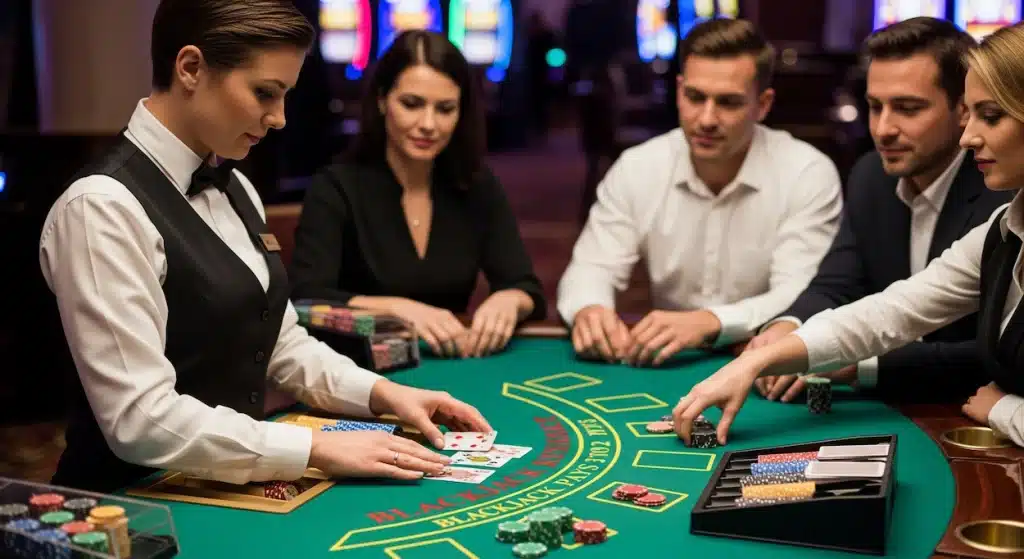The thrill of a blackjack table is undeniable. The rhythmic shuffle of cards, the satisfying clink of chips, and the tension of a high-stakes hand create an atmosphere of excitement unlike any other. But for a newcomer, this vibrant environment can feel intimidating. The unwritten rules of the game—the etiquette—can seem like a secret language, and a misstep can lead to an awkward moment. Mastering blackjack etiquette, however, is not about being a stuffy purist. It’s about respect: respect for the game, for your fellow players, and for the dealer. By understanding and following these simple guidelines, you can not only avoid common faux pas but also elevate your game, allowing you to focus on strategy and enjoy the experience to its fullest.
The First Impression: Taking Your Seat and Buying In
Your journey to playing like a pro begins before you even place a bet. When approaching a table, observe the flow of the game. Don’t just plop down in an empty seat. Wait for a hand to finish, and then politely ask the dealer if you can join. Once seated, you’ll need to exchange cash for chips. Never hand your money directly to the dealer. Instead, place your cash on the table, and the dealer will count it out, announce the amount, and then push the corresponding chips toward you. This is a crucial security measure that ensures the transaction is visible to both the dealer and the pit boss. Once you have your chips, it’s customary to place your bets for the next hand before the dealer begins to deal.
The Rules of the Game: Handling Your Cards and Chips
In most casinos, you’ll encounter one of two styles of blackjack: face-up or face-down. In face-up blackjack (typically played with two decks), all players’ cards are dealt face-up, and you’re not allowed to touch them. Your decisions—hit, stand, double down, or split—are communicated with hand signals. This is where the true “poker face” of blackjack comes into play. A simple tap of your finger for a hit, or a flat hand waved over your cards for a stand, are the universally recognized gestures.
In face-down blackjack (usually with six or eight decks), your first two cards are dealt face down. This is where many new players make their first mistake. While it’s tempting to grab your cards and fan them out, this is a major no-no. Instead, gently pick up your cards with one hand and keep them low to the table. This prevents other players from seeing your hand and maintains the integrity of the game. When you’ve made your decision, you’ll slide your cards under your bet to stand, or scratch the table to hit. If you get an extra card, the dealer will tuck it under your original two cards.
When it comes to your chips, remember to keep them organized. Stack them neatly in front of you, and when you place your bet, do so in a single, well-defined stack. This not only makes it easier for the dealer to see your wager but also prevents confusion about the amount you’re betting.
The Social Contract: Being a Good Tablemate
Blackjack is a social game, and a good tablemate is just as important as a good player. First and foremost, be mindful of the pace of play. Don’t take an eternity to make a decision, especially if you have a simple hand. If you’re a beginner and unsure of the right play, it’s okay to take a moment, but don’t stall the game. Similarly, resist the urge to offer unsolicited advice to other players. While you might see a clear strategic error, it’s their money and their game. Giving advice is generally considered rude and can even be a distraction. The only person you should be focused on is the dealer.
Another critical piece of etiquette is to never touch the cards or chips of other players. This seems obvious, but in the heat of the moment, a well-meaning gesture can be misconstrued. Leave everything in the hands of the dealer and the players themselves. And finally, when you decide to leave the table, wait until the current hand is over and then announce your intention to the dealer. This allows them to mark your seat for the next player without disrupting the game.
Tipping and Appreciation
Just like in a restaurant, it is customary to tip your dealer. Dealers work long hours and their income often relies heavily on tips. A small tip, whether a chip placed on the table for them or a bet placed for the dealer’s benefit, is a sign of appreciation for their service. The amount is up to you, but a general rule of thumb is a chip or two every hour, or a percentage of your winnings if you have a particularly good run. This small gesture goes a long way in building a positive rapport with the dealer and can make your time at the table more enjoyable.
Mastering blackjack etiquette isn’t about memorizing a rigid set of rules; it’s about showing respect and contributing to a positive, enjoyable environment for everyone at the table. By understanding the flow of the game, handling your cards and chips with care, and being a good tablemate, you can move from feeling like a beginner to playing like a pro. And when you do, you’ll find that the game is not only more strategic and rewarding, but also a lot more fun.







